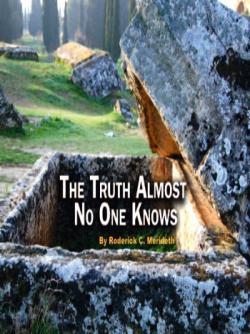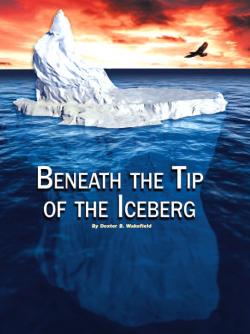The Big Dry
As Australia copes with unprecedented drought, what lessons can we learn—nationally and individually? Is God the reason for drought and other severe weather calamities, or do human beings need to examine their role in the problem? The truth may surprise you!
Is Australia's "drought of the century" easing?
What does the future hold for the parched continent "down under"?
Australia suffers worst drought in 1,000 years…" "Drought tightens grip on Australia…" "Australia's epic drought: The situation is grim…" These headlines grabbed the world's attention in 2006 and 2007, as Australians suffered under the weight of one of the most severe droughts on record. Thankfully, the year 2008 began with much-needed precipitation. But is the increased rainfall a sign of more good things to come? Or was it just a brief respite? Is the "Big Dry," as the drought of the last six years has been called, part of a normal climatic cycle, or are the weather patterns of Australia changing?
"Murray-Darling drought may be permanent," was the May 9, 2008 headline on a Sydney News-Herald story. "There is no end in sight to the drought," the article warned. And "it could become worse next year."
The Murray-Darling Basin covers much of eastern Australia, stretching from southern Queensland through New South Wales and Victoria and into South Australia. For the first time in recorded history, the water level of some lakes in the region has plunged to below sea level. Even after "good summer rains," the National Climate Centre at Australia's Bureau of Meteorology reports the rains "barely made a dent" in the drought.
Australians are no strangers to drought. In fact, Australia is the world's driest inhabited continent. Naturalist Charles Darwin wrote of the link he observed between Australia's dry temperatures and the resulting fires during his visit in January 1836: "In the whole country I scarcely saw a place without the marks of fire; whether these had been more or less recent—whether the stumps were more or less black, was the greatest change, which varied the uniformity, so wearisome to the traveller's eye" (Voyage of the Beagle, p. 324).
In her 1911 anthology, The Closed Door, Australian poet Dorothea Mackellar summed up the harsh but endearing climate of her beloved Australia in her famous poem, "My Country": "I love a sunburnt country, a land of sweeping plains, of ragged mountain ranges, of droughts and flooding rains. I love her far horizons, I love her jewel-sea, her beauty and her terror—the wide brown land for me!"
Drought: A Way of Life
Australians have come to expect drought as a way of life. Typically, three years out of every ten bring decreased rainfall and parched conditions. This regular cycle is also punctuated by occasional droughts of greater severity. Drought is so common in Australia that some experts suggest removing the word "drought" from any discussion about Australian climate, preferring to think of the swings of precipitation and temperature as normal fluctuations instead of unusual and unexpected events. This approach is reflected in Australian government policy; authors Linda Botterill and Melanie Fisher point out that learning to live with drought means essentially learning what it "means to be Australian" (Beyond Drought: People, Policy, and Perspectives, p. ix).
Why does Australia's climate vary so widely? One major factor is the regular patterns of the Southern Oscillation—a climate pattern that varies between El Niño climate events in which the warming ocean brings higher temperatures and less rain, and La Niña climate events in which the cooling ocean brings storms and increased rainfall, particularly to eastern Australia.
Is the "Big Dry" Different?
With such a history of drought, have Australia's recent drought conditions been any different? Yes, they have. As the Australian Bureau of Statistics noted, the 2002–2003 drought was in some ways unique and unusually severe for two reasons—it was accompanied by record high average maximum temperatures, and it affected virtually the entire continent (Yearbook Australia 2006, "Australia's Climate"). Drought conditions were persisting through the 2006–2007 growing season, when the Murray-Darling River Basin, which produces 40 percent of Australia's agricultural output, was at its driest in 116 years. Writing in Science News, reporter Emily Sohn noted, "The Australian continent has experienced dry spells since ancient times, but the length and severity of the current crisis have surprised even the most weathered climate experts " ("The Big Dry," October 27, 2007).
Even after welcome rains in December 2007, Australia's Bureau of Meteorology reported that "the worst of the long-term deficiencies are likely to remain for some time" ("Drought Statement," January 7, 2008).
Scientists agree that climate change in Australia is occurring faster than expected, and some are warning that global climate changes—including warmer temperatures in Australia—are here to stay. Such change, they say, will bring more lasting drought conditions. As the Australian Bureau of Statistics noted: "Temperatures in Australia were relatively stable from 1910 until 1950, and since then have followed an increasing trend, with an overall increase during 1910 to 2004 of approximately 0.7°C… Over Australia the observed warming has accelerated in recent years, and the late-20th century warming has been largely attributed to the enhanced greenhouse effect. (Yearbook Australia 2006, "Australia's Climate").
Writing in the Sydney Morning Herald, reporter Richard Macey observed, "It may be time to stop describing south-eastern Australia as gripped by drought and instead accept the extreme dry as permanent" ("This drought may never break," January 4, 2008).
Why Climate Change?
If Australia is in fact warming, and drought conditions are on the increase, why is this happening? One factor most people overlook when weather patterns change is that there is a God who intervenes in world events. The Bible reveals that God uses the weather to accomplish His will on earth. Whether the Big Dry intensifies or fades, Scripture makes it clear that God blesses those who serve Him with "rain in its season" (Leviticus 26:4), and that He uses the weather to scatter His enemies by His power (Job 38:22–23).
God made a covenant with ancient Israel, vowing to bless the nation with good weather if the people obeyed Him. Conversely, He warned that He would make their "heavens like iron" and their "earth as bronze" if they did not obey Him (Leviticus 26:19). Yet Israel rebelled. God warned them again and again to amend their ways. Finally, He said, "You only have I known of all the families of the earth; therefore I will punish you for all your iniquities" (Amos 3:2).
What would that punishment be? "'I blasted you with blight [drought] and mildew [excessive precipitation]… Yet you have not returned to Me,' says the Lord" (Amos 4:9). In spite of God's warnings and patient admonitions, Israel did not turn faithfully back to Him. Eventually, God allowed the northern ten tribes of Israel to be taken captive by the Assyrian empire.
What happened to those tribes that had rejected God? They did not vanish! During His time on the earth, Jesus Christ said He knew where the "lost sheep of Israel"—the so-called "lost ten tribes"—actually were (Matthew 10:6). The historian Josephus wrote of an "immense multitude" of Israelites "beyond the Euphrates" (Antiquities of the Jews, Book 11, Chapter 5).
Students of history and Scripture can today trace the migrations of the ten "lost" tribes, and can document their journey north and west to the British Isles and northwestern Europe. The peoples descending from Joseph's sons Ephraim and Manasseh settled in the British Isles, and many later migrated to Australia, New Zealand, South Africa, Canada and the United States.
In the past, God used weather to work with ancient Israel. Would He similarly use the weather today to bless—or curse—His people? Certainly, God sends the sunshine and rain on "the evil" as well as "the good," out of His bountiful mercy (Matthew 5:45). Yet the book of Revelation reveals that a time will come when God will use the weather more directly in dealing with rebellious human beings.
Jesus Christ prophesied that before His return, there would come a time of famine, and of death through hunger (Revelation 6:5–8). This time, He said, would lead into a great tribulation, also known as the "fifth seal" (v. 9). Scripture shows that this "fifth seal" will be a terrible calamity coming specifically upon the house of Jacob (Jeremiah 30:7)—which, in addition to the nation of Israel in the Middle East, today includes the nations of Australia, New Zealand, Great Britain, South Africa, Canada and the U.S.
This time of tribulation is prophesied to be a time of unparalleled suffering such as the world has never known (Matthew 24:21). Scripture reveals that tens of millions of the descendants of ancient Israel will perish. Addressing the whole house of Israel at this future time, the prophet Ezekiel warned: "One-third of you shall die of the pestilence, and be consumed with famine in your midst" (Ezekiel 5:12).
Ezekiel plainly warned of major droughts that would affect the modern descendants of ancient Israel: "When I send against them the terrible arrows of famine which shall be for destruction, which I will send to destroy you, I will increase the famine upon you and cut off your supply of bread" (v. 16).
The prophesied judgments on Israel will come as a result of their sins. But God will also use plagues to judge the nations of the whole world for their sins, and for following the prophesied "Beast power." Scripture shows that a time will come when two of God’s faithful servants will, for three-and-a-half years, be given supernatural power "to shut heaven, so that no rain falls in the days of their prophecy" (Revelation 11:6). Clearly, in the years just ahead of us, God will use the tools of drought and scarcity of food to teach modern Israel—and all human beings—important lessons of obedience toward Him.
Jesus Christ foretold that, before the calamities at the end of this age, during times of societal tumult and warfare, extreme weather patterns would begin to increase: "And you will hear of wars and rumors of wars. See that you are not troubled; for all these things must come to pass, but the end is not yet. For nation will rise against nation, and kingdom against kingdom. And there will be famines, pestilences, and earthquakes in various places. All these are the beginning of sorrows" (Matthew 24:6–8).
Why Punish Modern Israel?
Does God have a reason for punishing modern Israel—including the nations of Australia, New Zealand, South Africa, Great Britain, Canada and the U.S.? Moses prophesied that God would bless Joseph's descendants (including Ephraim and Manasseh) with the choicest places on earth. Notice: "Joseph is a fruitful bough, a fruitful bough by a well… by the Almighty who will bless you with blessings of heaven above, blessings of the deep that lies beneath, blessings of the breasts and of the womb. The blessings of your father have excelled the blessings of my ancestors, up to the utmost bound of the everlasting hills. They shall be on the head of Joseph, and on the crown of the head of him who was separate from his brothers" (Genesis 49:22–26).
Scripture elsewhere echoes the same blessings for Joseph: "And of Joseph he said: 'Blessed of the Lord is his land, with the precious things of heaven, with the dew, and the deep lying beneath, with the precious fruits of the sun, with the precious produce of the months, with the best things of the ancient mountains, with the precious things of the everlasting hills, with the precious things of the earth and its fullness, and the favor of Him who dwelt in the bush'" (Deuteronomy 33:13–16).
Have the modern nations descending from ancient Israel been blessed as these verses suggest? Although Australia only possesses about 7 percent arable land (compared to about 19 percent in the U.S.), its land is richly blessed with natural resources. Australia ranks first in the world in wool production, and second in production of lead, zinc, nickel and gold—ahead of the U.S. in all these areas. Australia is the world's third-largest coal producer, behind only China and the U.S., and it is sixth in wheat production. Australia ranks third in the world on the "human development index" established by the United Nations Development Program, which rates countries based on citizens' life expectancy, adult literacy, years of schooling, and personal income (Pocket World in Figures, 2006 Edition, pp. 30, 48, 50–53).
Yet, in spite of so many blessings, Australia is beset with social problems just like the rest of the modern Israelite nations. A 1990 report by the Australian Institute of Criminology unhappily concluded that Australia's crime rate is in some respects very high compared with other similar nations. "Australia is ranked third highest of the fourteen countries [studied] in terms of overall victimization… In assaults involving force, in the less serious types of sexual incidents, in burglary and in motor vehicle thefts, Australia ranked highest of all the countries surveyed" (A Comparison of Crime in Australia and Other Countries, p. 2).
The modern Israelite nations also rank high in addictive behavior such as pornography. In terms of revenue derived from pornography, the U.S. ranks third in the world, Australia fourth, the United Kingdom fifth, and Canada seventh. Australia actually outranks the U.S. in per capita revenue from pornography, by more than double.
Certainly, if God used drought and other calamities to punish ancient Israel for its sins, modern Israel cannot claim to be any less deserving of His correction.
Pray for Rain
In April 2007, when rain was urgently and desperately needed to save crops in the vital Murray-Darling basin, Prime Minister John Howard encouraged Australians to pray for rain. He said, "It is a grim situation, and there is no point in pretending to Australia otherwise. We must all hope and pray there is rain."
Will we pray for rain? Then will we give thanks when it comes? More importantly, will we acknowledge our sins—then repent and turn from them? Scripture records King Solomon's prayer at the dedication of the Temple: "When the heavens are shut up and there is no rain because they have sinned against You, when they pray toward this place and confess Your name, and turn from their sin because You afflict them, then hear in heaven, and forgive the sin of Your servants, Your people Israel, that You may teach them the good way in which they should walk; and send rain on Your land which You have given to Your people as an inheritance" (2 Chronicles 6:26–27).
As with droughts before it, the Big Dry has in one way or another touched the lives of all Australians. Farmers and ranchers have faced especially difficult challenges. Businesses have suffered. The routines of ordinary daily life have changed, as individuals have adapted to stringent water conservation regulations by not watering their lawns, not washing their cars, taking shorter showers and being diligent to collect rainwater. Droughts are times when everyone makes the necessary changes to meet the challenge and survive.
But will we make the more important spiritual changes in response to these climatic challenges? Do we see the "handwriting on the wall"? Do we want God's personal care and comfort for us and our family during coming times of stress and duress? Where will we turn, when the prophesied tribulations come?
Our only ultimate answer is to turn to God, our Creator and Maker. "Thus says the Lord: 'Cursed is the man who trusts in man and makes flesh his strength, whose heart departs from the Lord. For he shall be like a shrub in the desert, and shall not see when good comes, but shall inhabit the parched places in the wilderness, in a salt land which is not inhabited. Blessed is the man who trusts in the Lord, and whose hope is the Lord. For he shall be like a tree planted by the waters, which spreads out its roots by the river, and will not fear when heat comes; but its leaf will be green, and will not be anxious in the year of drought, nor will cease from yielding fruit'" (Jeremiah 17:5–8).
God blessed the nations of Joseph—and continues to bless them abundantly. But our time is running out, unless we turn from our sins, and turn towards Almighty God with all of our heart. This is the challenge, and the warning, Jesus Christ is giving to the nations of Australia, New Zealand, South Africa, the United Kingdom, Canada and the U.S.—and, yes, to the entire world! Will you heed it?






